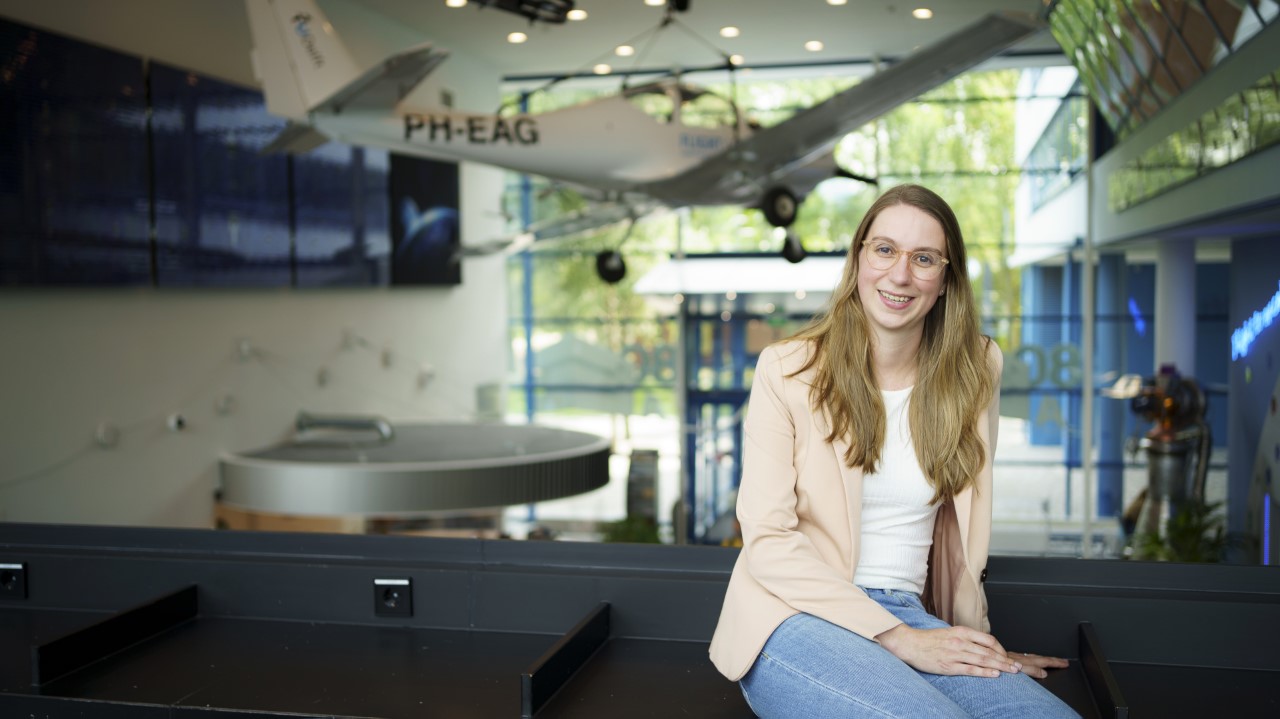Delphine de Tavernier is a wind-energy expert and one of 17 recipients from TU Delft of NWO’s Veni grant. Delta talked to her about her research into morphing-wing technology.
Researcher Delphine de Tavernier wants wind turbine blades to mimic the wings of birds. (Photo: TU Delft)
English only
The Dutch Research Council (NWO) recently awarded 17 TU Delft researchers with grants of up to EUR 280,000. This will allow the laureates to further develop their own research ideas over the next three years.
Assistant Professor Delphine de Tavernier, one such grateful recipient from TU Delft in the field of Aerospace Engineering, discusses her research into morphing-wing technology, and how grants like these can help advance research.
A TU Delft local
Her office, rather bare, belies the trove of knowledge that she extolls with enthusiasm. Although she is from Ghent, Belgium, she has completed – disregarding time spent on exchange abroad – all her academic milestones thus far at TU Delft.
After a dozen years at the Aerospace Engineering Faculty, she is still driven by ‘the pleasure of finding things out’, as Nobel prize-winning Physicist Richard Feynman put it. “In research at university, it’s about the topic and finding new things out and exploring. I had the feeling that if I go to industry it’s more about working towards a product, well to say it in short – towards money.”
‘What’s driving our research here is understanding’
De Tavernier’s recently funded research takes a cue from birds. Wind patterns are quite heterogeneous, even over relatively small scales. Yet, birds are able to navigate and glide deftly through the air without experiencing turbulence in the way aircraft do. This is because they are “able to make very small changes to their wings mid-flight”. To create ‘morphing-wings’ that can mimic birds is not a new concept; however, applying it to wind turbines is a novel idea. Wind turbine blades also experience turbulence and suffer from efficiency losses due to their inability to make these same small adjustments while operating.
Every little helps
De Tavernier’s preliminary calculations suggest a difference in efficiency of 3% between turbines able to adapt to heterogeneous airflow, and those that cannot.
These efficiency losses may seem small, but considering we are talking about hugely expensive machines that run continuously for months at a time, with a total lifespan of 20 years, they add up. De Tavernier explains “if you translate that into annual energy production, then 3% is a lot.”
De Tavernier spoke about how grants like these contribute to society. “We can use the grant for the specific research that we want to do, independent of funding that comes from other people.” She continues, saying “what’s driving our research here is understanding. It is about thinking about the future, even a step further than the future, not just tomorrow, but what comes after”.
Wonder Woman
As the conversation with De Tavernier comes to a close, she relays that the definitive project will only begin in March of next year. She pushes herself away from the desk, revealing a noticeably round abdomen. “I’m not sure if you have seen it? There is a baby on the way.” I had not. “Wow, so, you have two babies on the way?” I quip. “Yes, I have a research project baby and a physical baby” she replies, adding cheerful laughter.
- NWO awarded funds not only to TU Delft researchers. In fact, the University of Amsterdam (UVA) led the pack in terms of total Veni grants (18). This year, 1,462 recent PhD graduates applied for a grant. In total, 188 scientists (13%) spanning the full breadth of scientific fields – including the social sciences – were successful.
- You can see the press release from TU Delft listing the other 16 recipients here. NWO also posted a more thorough breakdown of the Veni grant recipients.
Oscar Greenwell / Editor



Comments are closed.